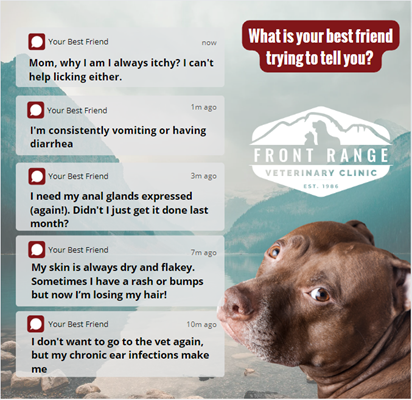May is Asthma and Allergy month, and your team at Front Range Veterinary Clinic wants you to know what signs to look for and how you can keep your best friend comfortable as allergy season kicks into full gear!
Allergy

What is an allergy? You have allergies but does your dog or cat? How would you know?
An allergy is a state of hypersensitivity to a specific substance (allergen). Allergens can come from food, plants, insects or other animals. Symptoms often start around 6 months of age but can begin sooner. The most common food allergies are actually related to the protein in your pet’s food. What are the top contenders? Beef and Chicken. The most common symptom, in dogs, is itchy skin. This can either be all over the body or in just one area. However, there are a wide variety of symptoms such as, vomiting or diarrhea, dry/flakey skin, rashes or bumps, hair loss, needing their anal glands manually expressed frequently, or having chronic ear infections.
What can you do about it?
There are several methods to help relieve your pet’s symptoms, if your pet is experiencing any of these symptoms, please give us a call at (970) 484-5667 to discuss potential allergies and what method of treatment is right for your pet.
Asthma

Have you noticed your cat (or dog) coughing or wheezing a lot? Well, it may not be “just allergies”, but something more concerning. Asthma is inflammation of the airways associated with several physiologic effects and is a fairly common condition in cats. This condition is commonly seen in cats 2 to 8 years old.
Other symptoms include:
- Decreased energy
- Shortness of breath
- Wide-mouth breathing
- Coughing up foamy mucus
- And more!
What creates an increased risk to develop this condition? Overweight and obesity and dental disease can increase the risk of your pet developing asthma.
What can trigger an attack?
A wide variety of things can trigger your pet to have an attack but here are a few: cat litter dust, air fresheners, scented laundry detergent/fabric softeners, mold/mildew, essential oil diffusers, smoke.
How do we diagnose?
First, we need to rule out other conditions such as upper respiratory infection, heartworm disease, parasites, or cancer. We recommend performing blood work and/or chest x-rays to rule out these other conditions.
How do we treat?
There are several methods to help treat your pet asthma. If you feel like your pet is exhibiting signs of asthma, please give us a call at (970) 484-5667 to schedule an appointment!




